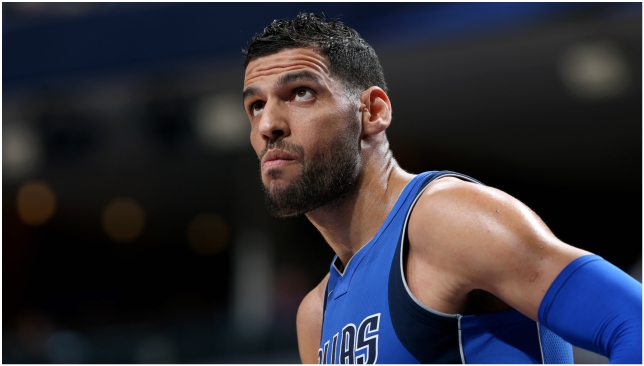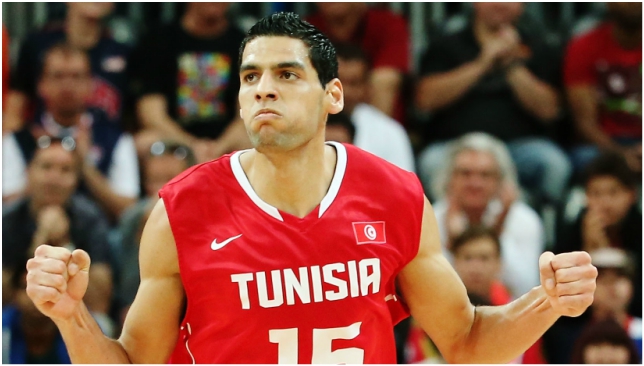
The broad shoulders of Salah Mejri prop up more than just his oversized jersey – they carry the pride of the Middle East as one of the only active players in the NBA to represent the region.
At 7-foot-2, 235lbs, the hulking Tunisian centre cuts an imposing figure impossible to miss, even in a league defined by athletes of extraordinary size.
Yet Mejri is far from a household name, having carved out a modest, but useful, career in the NBA as a bruising big man – a role which has become antiquated as the league’s overarching playing style has shifted to feature more skill.
The 31-year-old just wrapped up his third season with the Dallas Mavericks – and potentially his final one with the team as he’s set to become an unrestricted free agent – coming off the bench in all but one of his 61 appearances to average 3.5 points, 4.0 rebounds and 1.1 blocks in 12.0 minutes per game.
No one will be confusing him with the likes of LeBron James or Kevin Durant anytime soon, but while those superstars have the burden of being the faces of the NBA, Mejri has his own responsibilities as one of the faces for a region.
Abdel Nader is the only other Middle Eastern player in the league at the moment, with the Egyptian still in the midst of his rookie season with the Boston Celtics, who are preparing to begin their playoff run.
“I hope the next season we will see more (players from the Middle East),” Mejri told Sport360°. “But it’s very exciting for me to represent MENA (Middle East and North Africa). It’s nice, it’s exciting, it gives me a lot of responsibility and puts a lot of pressure on me, but I like pressure and I like responsibility.
“I like to make these people happy and for sure they’re pushing me on social media or showing up to the games, so I just want to tell everybody I’m here to make you proud and I will do my best when I’m out there to make you happy and proud.”
The Middle East isn’t exactly a pipeline for NBA talent, but Mejri’s own path to the league should inspire hope for more players to come out of the region.
Like many in Tunisia and its neighbouring countries, Mejri grew up fully immersed in a football culture. He didn’t make the transition from handling a ball with his feet to handling it with his hands until he was 18, but the combination of his footwork and height helped him pick up an unfamiliar sport relatively quickly.
Three Marines told Salah Mejri to make a 3-pointer with no hands. No problem, he said. Priceless. pic.twitter.com/bTSQ9NAzgb
— Eddie Sefko (@ESefko) December 30, 2017
It took him years to finally reach the NBA in 2015, with stops along the way in the Tunisian Basketball League, the Belgian League, Liga ACB and the EuroLeague, but as Mejri has developed and progressed as a player, so too has basketball in the Middle East.
“When I started playing basketball in 2005, there was not a lot of people talking about basketball in that part of the world,” Mejri said. “Now, in Jordan it’s the first sport. In Lebanon it’s the first sport. Maybe some other places it’s the first sport too. I mean there are good Arabic, Middle Eastern and North African teams that are getting better.
“I speak, for example, about Tunisia. We are a way better team than we used to be. So for sure basketball is getting better and teams are growing. There are a lot of kids getting involved with the game and that’s something that needs to happen.”
Mejri isn’t just talking about what needs to be done to further the sport either. He’s actually holding camps for kids to discover talent from Middle East nations.
According to Mejri, he’s had nine kids from Egypt and Tunisia come to the United State over the last three years to showcase their skills and more camps are being planned with destinations like Morocco and Dubai in mind.
“It’s free, people just have to show up and enjoy meeting with me, an NBA player, who is an example for all these kids who are living there,” Mejri said. “I grew up there and played basketball there so I’m trying to give them an opportunity that I didn’t get when I was a kid. I think that makes a lot of people excited.
“I remember this year when I did a camp in Tunisia, we asked for 200 kids and 700 showed up. They even flew from France just to come to the camp. It was wild for me, like this is the first year I’m doing it and already people are coming in this number. It was surprising for me and we’re going to keep doing it. We’re getting support also from my sponsors back home, from the NBA, NBA Africa too, so why not?”

It seems inevitable the NBA will host a game in the Middle East in the near future as well, whether it’s an exhibition or regular season contest.
But for the league, there’s probably a ‘chicken or the egg’ question concerning fandom in the region. Should they host a game in the area with the hope it will directly boost interest, or wait until interest is high enough before bringing over the product? In all likelihood, it’s a mix of both.
Mejri feels the NBA may be a little hesitant to host a game in the Middle East right now because of their perception of the sport’s popularity over there, but he’s confident the infrastructure and hunger is already established.
“Believe me, I’m putting a lot of pressure on Kim Bohuny (senior vice president, international basketball operations at NBA) and you have to get a big fan base to run such games,” Mejri said.
“They do one in China, they do one in Mexico, they do one in England. You don’t see in the Middle East, but somebody has to push the NBA and push all these people responsible here to make such a game. It’s not easy for them maybe because they don’t have the right contacts.
“With me trying to connect everyone together, maybe we’ll try to make something happen because for sure we have big arenas and everything to organise such a game, whether in North of Africa, Middle East or Dubai for sure. But the thing is if people are going to be interested in showing up in big numbers to watch a game.
“I’m sure they are. I know they are.”